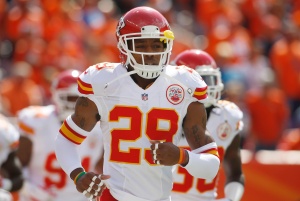Another piece of the Chiefs’ 2015 roster picture is in place with outside linebacker Justin Houston receiving the franchise tag.
But there are many more decisions to make in this choose-your-own-adventure offseason, where each option brings solutions and dilemmas.

Dec 28, 2014; Kansas City, MO; Chiefs outside linebacker Justin Houston (50) sacks Chargers quarterback Philip Rivers (17) in the first half at Arrowhead Stadium. Credit: John Rieger-USA TODAY Sports
The Chiefs salary cap for the 2015 season is $146.14 million, according to the NFLPA. The total includes the official cap of $143.28 million announced Monday and the Chiefs carry-over of $2.86 million from last season.
Houston’s franchise tender is worth a one-year, $13.19 million contract. Accounting for all other players under contract, the franchise tag currently puts the Chiefs at a total payroll of $152.8 million dollars including projected draft pool money, according to spotrac.com, a site that tracks salary caps.
That places the Chiefs at $6.6 million over the cap as of Monday evening, according to spotrac.com.
That doesn’t include the compensatory picks the Chiefs expect to receive in the 2015 NFL Draft for losing Branden Albert, Tyson Jackson, Jon Asamoah and Dexter McCluster, among others, to free agency last season.
It also doesn’t project potential spending Kansas City could use on its own pending unrestricted free agents, such as center Rodney Hudson, safety Ron Parker, free safety Kurt Coleman or right tackle Ryan Harris, among others.
The Chiefs must be under the salary cap by March 10, the start of the league’s calendar year, which means tough choices must be made soon.
CUTS AND RENEGOTIATIONS
The quickest way for the Chiefs to get to the $6.6 million under the salary cap over the next week is through cutting veterans or renegotiating deals.
And numerous media reports reflect defensive lineman Mike DeVito could be one of them.
DeVito missed almost the entire 2014 season after suffering a torn Achilles tendon in the regular-season opener against the Tennessee Titans. Releasing DeVito would save the Chiefs $4 million against the salary cap.

Nov 2, 2014; Kansas City, MO; Chiefs quarterback Alex Smith (11) talks with quarterback Chase Daniel (10) during the second half against the New York Jets at Arrowhead Stadium. Credit: Denny Medley-USA TODAY Sports
Another quick savings could come through cutting ties with backup quarterback Chase Daniel. Releasing Daniel would save $3.8 million in cap money.
But parting ways with Daniel would leave the Chiefs without a proven backup to starter Alex Smith. The only other healthy quarterbacks on the roster are former Raiders quarterback Terrell Pryor and 2014 draft pick Aaron Murray. Tyler Bray suffered a torn ACL in January.
The largest potential savings involves the contract of linebacker Tamba Hali, who has one year remaining on a five-year, $57.5 million contract. Hali has a cap number of almost $12 million in 2015, but the Chiefs could save $9 million by cutting ties.
Hali is also a target for a renegotiated contract. If the veteran were willing to settle for a minimum salary in 2015 along with a small signing bonus and guaranteed money over a three-year extension, the Chiefs could cut his salary cap number in half.
Wide receiver Dwayne Bowe carries the second-biggest cap hit on the team of $14 million. However, with his outstanding prorated bonus money, his cap savings is just $5 million. He would still count $9 million toward this year’s salary cap. It would also leave the Chiefs without a veteran wide receiver with extensive experience on the roster.
The Chiefs could designate Bowe as a post-June 1 cut, allowing the Chiefs to spread his remaining bonus money over the next two seasons. However, that wouldn’t provide any cap savings now — it would only provide relief for 2015 on June 1. The designation is designed to allow veterans an opportunity to find a new team but does not accelerate the team’s cap savings.
Other potential but less likely targets for cuts or renegotiations are cornerback Sean Smith, linebackers Derrick Johnson and Joe Mays and defensive lineman Vance Walker.
Releasing Smith, who enters the final year of his contract, has a cap savings of $5.5 million this year. Johnson, who also enters the final year of his contract, carries a cap hit of $5.25 million with no dead money.
But Smith was the team’s most effective cornerback last year, and it would be difficult to replace him in free agency at a better value. Johnson is coming off a season-ending Achilles injury.
Cutting Walker would save just $1.75 million, which actually becomes just $1.25 million when a replacement contract takes his place. Releasing Walker only seems to make financial sense if the team must make a small move to get under the cap.
EXTENSION FOR JUSTIN HOUSTON
While the Chiefs will have to contort the salary cap to squeeze Houston under the cap for now, an extension with the All-Pro linebacker would actually provide some short-term salary cap relief. Unfortunately, if Houston doesn’t sign until July, that will be too late for the team to benefit this year for free agency and the draft.
Unless Houston negotiates a new contract soon, any cap savings the Chiefs generate will have to carry over in some way to 2016.
For example, the contract extension signed by Houston Texans defensive end J.J. Watt provided for $30 million in guaranteed money at signing that guaranteed his 2014-15 salaries, signing bonus and a one-year roster bonus in 2015.
The benefit is the Texans took a low salary cap hit the first year and a larger hit in 2015. After that, Watt’s salary cap number is smaller and the dead bonus money is negligible.
The Chiefs could sign Houston to a similar contract, providing more bonus money or guaranteed money in 2015 for a smaller cap hit in 2016. Or the team could choose to take a larger hit in 2016 when more cap space is available.
Signing Houston to a long-term extension would allow the Chiefs to keep Houston’s 2015 cap number low. For example, Watt’s six-year, $100 million contract extension with the Texans allowed just a $4.6 million cap hit in year one.
Conversely, defensive end Mario Williams’ six-year, $96 million contract with the Buffalo Bills had a $9.8 million cap number the first year.
While the Chiefs are strapped for cash in 2015, there is potential for significant cap savings in 2016. Several of the Chiefs highest-priced veterans have contracts expiring after next season, including linebackers Hali and Derrick Johnson, safety Eric Berry and cornerback Sean Smith.
The biggest looming contract for 2016 would be an extension for defensive tackle Dontari Poe.

Sep 14, 2014; Denver, CO; Chiefs safety Eric Berry (29) before the game against the Denver Broncos at Sports Authority Field at Mile High. Credit: Chris Humphreys-USA TODAY Sports
BERRY’S FUTURE
One of the most difficult challenges facing the Chiefs surrounds the future of Berry. Cutting the popular safety while he’s battling lymphoma could prove wildly unpopular with fans and inside the team’s locker room.
It’s arguably a decision no one wants to make.
However, there are options that could help the Chiefs and protect Berry as well. Placing Berry on the non-football injury list would provide temporary relief of his $5.1 million base salary for 2015. If Berry is able to return by Week 6 of the regular season, the Chiefs would owe him the pro-rated balance of his contract.
If Berry is unable to play in 2015, his contract is essentially frozen. He would not count against the salary cap, and would still have one year remaining on his contract with the team if he were able to return in 2016.
THE UNTOUCHABLES
Despite signing a renegotiated contract last summer, Jamaal Charles has one of the team’s lowest dead cap numbers. It would only cost the team $1.3 million in dead cap money to release Charles and would free up about $6.7 million in cap space. But Charles is likely among the few untouchables on the team.
The other untouchable on the team is quarterback Alex Smith, whose contract extension signed last year guarantees $10.9 million of his base salary for 2015. Couple that with $14.4 million in remaining prorated signing bonus, and Smith would cost more to cut than to keep next season.
While the Chiefs signed new contracts with Charles and Smith last year, it is not in the team’s recent history to extensively restructure contracts.
Restructuring contracts is different than a renegotiation. Renegotiation replaces the existing contract and provides more money and a longer term. That’s what the team did with Charles last year. Smith signed an extension, which kicked in after he finished his last contract in 2014.
Restructuring typically involves the player giving up salary in exchange for bonus money that is spread out over the length of the new contract. The player essentially receives the same amount of money, but the salary cap burden is shifted to a different year or over a period of years.
Only one Chiefs player currently has a restructured contract with delayed bonus money. That would be Berry. That history suggests it is unlikely Smith or Charles will sign restructured contracts.
Whatever choices the Chiefs make to navigate the salary cap before March 10, there will definitely be consequences.
While the Chiefs can make moves to get under the cap to allow for Houston’s contract, more moves may be necessary if the team wishes to enter the free agent market and if the Chiefs receive additional compensation picks in the 2015 draft.
